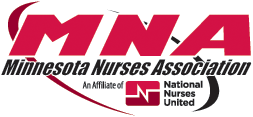Have a story you want to share? Contact MNA’s John Nemo for details.
Our 6-year-old daughter has been admitted to Children’s three times for pneumonia and asthma-related bouts. Her first stay at Children’s Hospital was when she was 2. Most recently, last fall, Sarah was in the ICU, and we were as frightened as ever that we would lose her. The nurses were unfailingly attentive to her, and to us. They kept us informed, giving us updates, helping us interpret stats, answering questions, and referring us to the right people when they themselves didn’t have the answers. They were calm, compassionate, knowledgeable.
I can’t tell you how many times the nurses spent extra time talking with us, explaining things, or even just telling us stories, joking, bringing us popsicles, or listening to us tell them stories. They devised new and clever ways of attaching the pulse-ox monitor and the cannula so that I could sleep next to Sarah at night. They explained how the IV works. They brought us DVDs from other floors when we’d seen everything in the ICU stash. They were on top of every beep, whistle, and cricket that came from Sarah’s machines. Toward the end of our most recent stay, when Sarah learned that our cats were a major trigger of her asthma, she burst into tears in fear of having to give them up; our nurse sat beside Sarah for a long time and explained how she herself has asthma and kitties, and how she washes her hands and takes her meds, and all is well.
The nurses have always been our main contact, the “front-line,” our first and best interaction with the medical staff. Don’t get me wrong–we were grateful to and impressed by all the medical personnel. But it’s the NURSES that we as patients got to develop relationships with and depended on most consistently. At any given moment, it was the nurses who knew Sarah’s story and condition the best. There are dozens of people moving in and out of those hospital rooms, a blur, and seeing our only child with tubes running in and out of her, we were beside ourselves. The nurses helped us make sense of what was happening, took care of Sarah, and took care of us.
I think we’ve now got the magic combination of meds and hygiene discipline to keep Sarah out of the hospital for a good long time. Is it sappy to mention that for months after we were discharged, Sarah said she wanted to be a nurse when she grew up? Well, it’s true.
Best,
Anna George Meek

![Sarah in Hospital[1] A patient and her mother.](https://mnnurses.org/wp-content/uploads/2010/05/sarah-in-hospital1-300x265.jpg)

